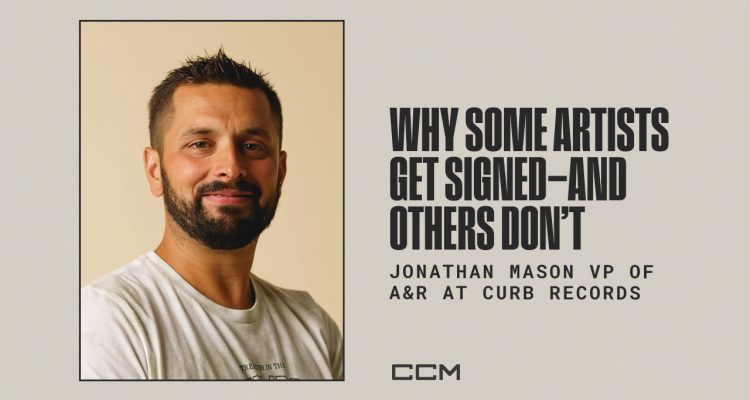“I was just a part of a band.”
That’s how Jonathan Mason, now Vice President of A&R and Publishing in the Christian division of Curb Entertainment, sums up the unlikely start of his journey into the music business. For someone now shaping the careers of artists like Big Daddy Weave, Meredith Andrews, Sidewalk Prophets, and newcomers like Lloyd Nicks, Matthews, and Carly Ann Taylor, it’s a reminder that calling often starts quietly.
“We were together about ten years,” Jonathan says of that early worship band. “In that band, I became a manager, became a booking agent—kind of became all things music business—and had no idea that it was leading me into what I’m in now.”
He now stands at the intersection of creativity, ministry, and industry—where songs are written, artists are discovered, and careers are built. But ask Jonathan what matters most in signing new talent, and he doesn’t hesitate: “We say it’s heart over art. There’s so many people that are great—they’re talented—but they don’t really have a message. They don’t really have a calling. Sometimes it’s more, they just want to be a big name.”
In Christian music, that heart-check is non-negotiable.
“When I see somebody that—there’s a calling, there’s a message, there’s a passion—that they’ve matched with their gifting, that’s what attracts me to somebody.”
This principle shaped the signings of his newest artists—Matthews, Lloyd Nicks, and Carly Ann Taylor. “They carry something that I think is powerful. Needs to be heard,” he says. “They have a ministry that really is going to touch people. They make you feel something even before they sing… Our job isn’t to create something out of nothing. Our job is to add to, to support, to help, to expand.” Behind every signing, there’s a strategy—but also a strong sense of calling. Jonathan isn’t just reading streaming reports. He’s watching live performances. He’s talking to co-writers. He’s listening for something deeper.
“If there’s an artist that has an incredible voice, but they’re waiting for everybody else around them to do something for them—they’re not playing live, they’re not involved in their local church, they’re not actively posting on socials—that’s a red flag. Our job is to help, but we can’t build it from nothing.”
Even the tools have changed. “Social media is the storefront now,” he explains. “It’s our billboard.”
Yet even in the digital world, old-fashioned trust and human connection still carry weight. “We just finished up our Sidewalk Prophets album… I meet with the artist, hear what’s going on in their life, recommend co-writers or producers. When there’s trust, it works. There was one writer I threw into the mix—Justin Richards, the guitar player for Dan + Shay—he wanted to write more Christian music, and it turned out to be one of their new favorite collaborators.”
Whether it’s overseeing album production, matching artists with producers and songwriters, or finalizing deliverables before release, Jonathan thrives in the background. “Nobody normally would know my name. They might now” he laughs. “But I’m behind the scenes, really trying to help them to walk in their gifting.”
He’s also the first to say there’s no one path into this industry. “I wasn’t looking for this. It kind of found me in the going,” he says. “I went to Moody Bible Institute. I went to seminary. I studied business for a year. I have all this hodgepodge of whatever-ness—and I fast-forward and realize, all of that was part of what prepared me for what I’m doing.”
For those who feel called to Christian music but aren’t performers, Jonathan reminds them that the industry is bigger than most realize. “There are so many jobs—radio promo, digital strategy, royalties, video, A&R, marketing. If someone wants to get into the scene, you just have to do it. Find internships. Volunteer. It’s a relational business.”
The fruit of that mindset shows up in moments like the success of “Make Room,” a worship anthem sung globally. “That song came out of the second co-write with someone I had just randomly met through two different people in the same week. There’s no formula. Sometimes God just drops it in your lap.”
When asked what he listens to outside his roster, Jonathan lights up. “There’s a song called Anywhere by The Gray Havens… I just play it on repeat. I think it’s a masterfully written song. And it tells a story in a way I haven’t heard told before anywhere. Period.”
He’s equally excited about where Christian music is headed: out of the genre box and into a broader world.
“I think we have good days ahead,” he says. “In one sense, creating Christian music as a genre might have hurt us… it puts everything in this box. But now I’m seeing Christian music step out of that.”
He talks about the rise of worship music and how even that label is changing. “We use this word worship and it’s like, what is worship these days? There’s pop-sounding stuff that younger kids love and call worship, but it’s not singable in church. And that’s okay—it’s just a new category. Worship leaders can become some of the best artists and entertainers.”
At the end of the day, whether he’s talking about signing talent, building albums, or serving artists, Jonathan’s vision is clear: “Yes, they’re working hard. Yes, they’re making connections. But when things happen, it usually is—you look back and say, Wow, I can’t believe that God dropped that in my lap.”
That’s the heart of it all: do the work, be faithful, and trust that the right doors will open in His timing.


Leave a Reply
You must be logged in to post a comment.